Founded in 1630, West Roxbury, Massachusetts is the home of the abolitionist and Unitarian minister Theodore Parker and the place where the Puritan missionary John Eliot is believed to have preached from “Pulpit Rock” to the Native Americans who had long populated the region. Most famously, it is the town where, in 1841, Unitarian minister and Transcendentalist George Ripley and his wife Sophia Dana Ripley an educator and early feminist, established the Brook Farm Institute of Agriculture and Education, better known as the utopian community of Brook Farm.
The Ripleys—along with Ralph Waldo Emerson, Margaret Fuller, William Henry Channing and Elizabeth Peabody and several others—were members of the Transcendental Club. They met in their home, in Peabody’s bookstore on West Street in Boston, and in Emerson’s home in Concord to discuss Transcendentalism: an idealistic belief that men and women are inherently good and that social institutions are inherently corrupt. Transcendentalists believed that individuals were at their best when they were independent and self-reliant. As a result, they have the ability to form true and harmonious communities. It was during these meetings that they began planning the publication of their literary journal The Dial (1840-1844) under editor Margaret Fuller and assistant editor George Ripley.
Boston in the 1830s was tumultuous. William Lloyd Garrison began publishing his abolitionist newspaper The Liberator in 1831 and was mobbed in 1835 for his abolitionist beliefs; Eliza Small and Polly Ann Bates, two escaped enslaved women, were arrested in Boston Harbor, leading to the Abolition Riot of 1836; and the 1837 Broad Street Riots between Irish immigrants and Boston residents embroiled the city in street fighting. Boston was growing and becoming industrialized, and financial panic in 1837 led to a deep depression. Surrounded by this instability and growing more conflicted about his vocation, Ripley resigned his ministry from the Purchase Street Church in Boston in May 1840 but was refused.
Although Ripley continued his ministry in Boston, he and Sophia left the city and moved to Brook Farm. In a letter to minister and musician John Sullivan Dwight dated August 1, 1840, Sophia describes their 180 acres of idyllic land:
“We are nearly two miles from any creature, but one or two quiet farmers’ families, and do not see so many person here in a month as we do in the morning at home. Birds and trees, sloping green hills and hay fields as far as the eye can reach and a brook clear running . . .”
That October, during a meeting of the Transcendental Club, Ripley discussed founding a community at Brook Farm with Ralph Waldo Emerson, Bronson Alcott and Margaret Fuller and invited them to live there. Emerson and Fuller declined the invitation, but they both visited. Alcott later founded the short-lived Fruitlands community in Harvard, Massachusetts.
On January 1, 1841, Ripley formally resigned from his church and gave his last sermon on March 28. A few days later, he moved to Brook Farm permanently and began planning his ideal community, including the establishment of the school. Believers started moving in and actively participating in all aspects of farm work; among them were author Nathaniel Hawthorne, who wrote The Blithedale Romance, a novel about his experience living on the farm.
The Brook Farm Institute of Agriculture and Education was organized on September 29, 1841. Stock at $500 a share was issued, officers were elected, and articles of association were written. Ripley believed that both the intellectual and labor classes shared a commonality in that their work held no meaning for them. Based on gender equality, the intention was to share the labor in order to achieve economic self-sufficiency. Their amusements allowed everyone an equal chance for social, intellectual and spiritual growth.
Between 1842 and 1844 the farm experienced several changes including the addition of buildings, one of them the Margaret Fuller Cottage. The one constant was its school, which was excellent and its main source of income. The Farm always struggled financially and in 1844, it converted to the ideas of Charles Fourier, who advocated for a society that was divided into cooperative communities of small self-sustaining groups called phalanxes. With the conversion came a new constitution and the name Brook Farm Association for Industry and Education. In 1845, it was incorporated as the Brook Farm Phalanx. For some Brook Farm members, the restructuring was not the solution Ripley believed it to be because it did not address its deep financial problems.
From 1845-1847, The Harbinger, a journal dedicated to social and political reform, was published at Brook Farm and edited by Ripley. A fire in 1846 destroyed the central building. The fire, an outbreak of small pox and continuing financial difficulties contributed to the dissolution of the community in 1847.
Today, Brook Farm is an historical landmark whose legacy lies in its intellectual and literary past. It was acquired by the Commonwealth of Massachusetts in 1988 and is managed by the Department of Conservation and Recreation (DCR). The public is welcome to experience the beauty and the history of the "city of God - anew."
The BPL's Collection of John Sullivan Dwight correspondence regarding Brook Farm (1840-1848)
The Boston Public Library holds a collection of thirty-two letters written to John Sullivan Dwight related to Brook Farm. This correspondence covers a variety of subjects including George Ripley’s resignation from the Purchase Street church in 1840, Sophia Ripley’s description of early life on the Farm, Albert Brisbane’s observations on the progress of associationism, the future prospects of the community after the Phalanstery fire, and William Henry Channing’s thoughts about the future of the reform movement. Many of the letters in this collection were printed in Zoltan Haraszti’s The Idyll of Brook Farm as Revealed by Unpublished Letters in the Boston Public Library (1940).
Finding aid for John Sullivan Dwight correspondence regarding Brook Farm, 1840-1848.
Related archival material at the Boston Public Library
Mack Family Correspondence: David Mack (1804-1878), graduated from Yale College in 1823 and studied law under his uncle, Judge Mack, in Salem, Massachusetts. He practiced law in Andover for a short time until he began teaching. Mack was one of the signers of the original agreement to establish Brook Farm. In 1841, he helped found the Northampton Association of Education and Industry, a utopian community, located near Northampton, Mass. Based on communal living and racial equality, the Association set out to reform the existing industrial system based on competition and division of labor to one of mutual cooperation.
Related archival material at other institutions
Massachusetts Historical Society
George Ripley papers, 1834-1882
The Brook Farm watercolors of Marianne Dwight
For further reading
Codman, John Thomas. Brook Farm. Boston: Arena publishing company, 1894.

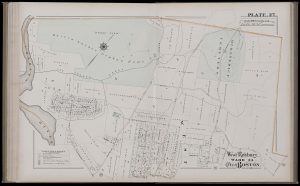
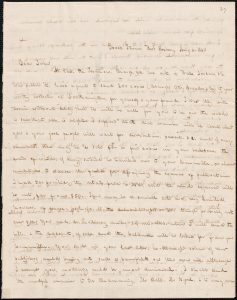
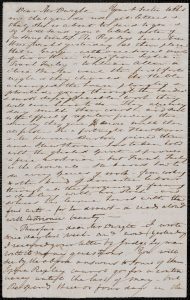
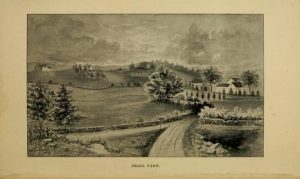
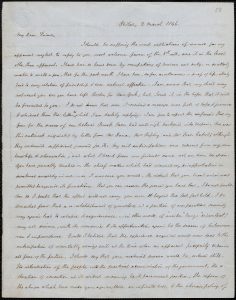

Add a comment to: Brook Farm – “city of God, anew”